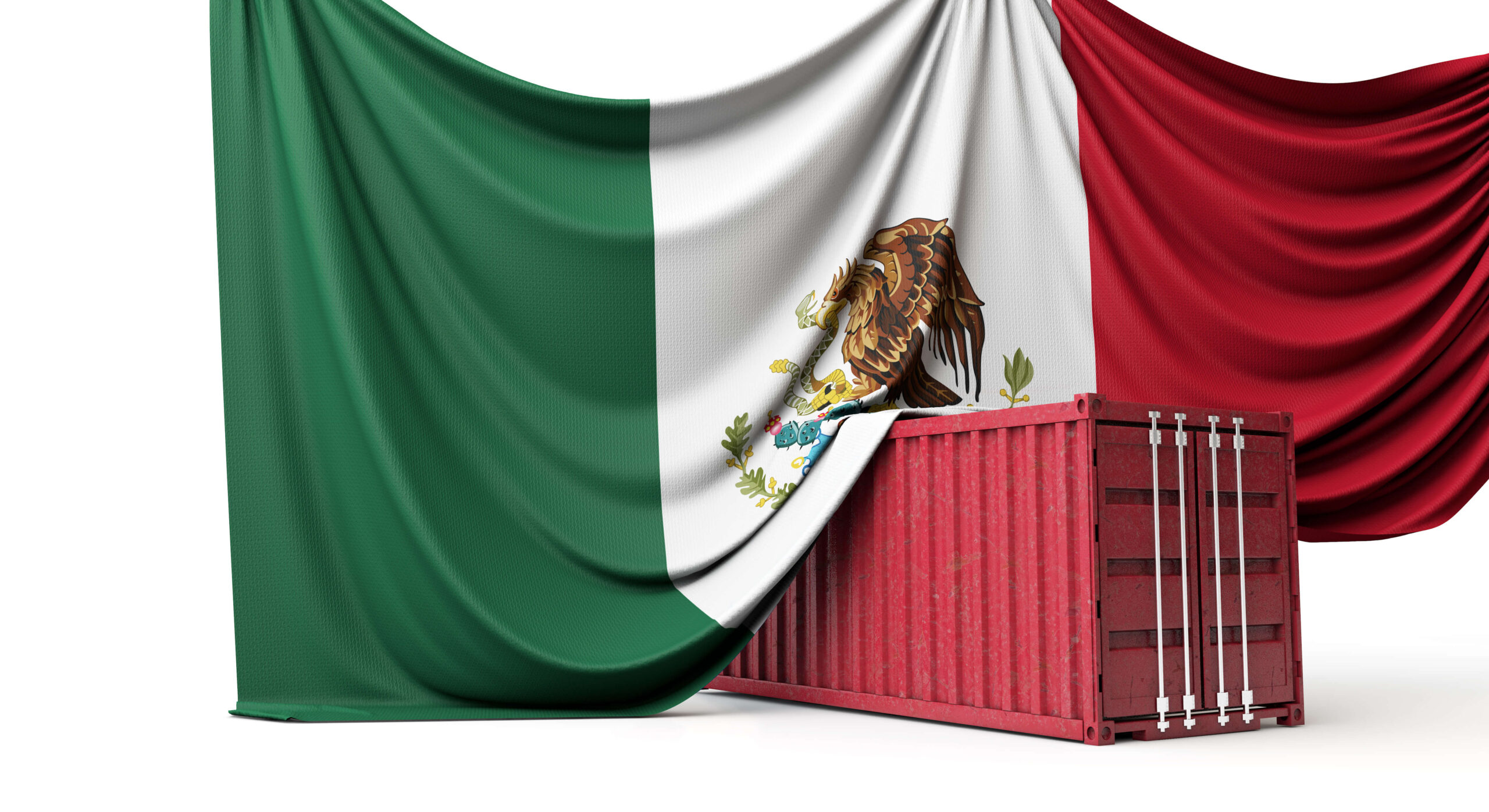Recent regulatory changes in Mexico may pose challenges for companies importing goods. On December 19, 2024, President Claudia Sheinbaum announced increases in tariffs on textile goods and textile inputs. The decree, effective immediately, also imposes restrictions on temporary textile imports under the IMMEX Program, which previously allowed duty-free imports for manufacturing and re-export. Referred to by some as “Mexico’s IMMEX apparel import ban,” these changes may disrupt supply chains and create complexities for apparel brands that depend on Mexico for streamlined trade.

What Changed?
While the fashion industry was digesting news of President-elect Donald Trump’s proposed tariffs—including a 25% tariff on all imports from Canada and Mexico and a 10% tariff on goods from China—Mexico introduced its own sweeping measures. On December 19, 2024, Mexican President Claudia Sheinbaum announced measures to protect domestic textile and apparel industries, including:
-
- Tariff Increases:
-
- Finished Textile Goods: Tariffs increased from 20–25% to 35%.
-
- Textile Inputs: Tariffs increased from 10% to 15%.
-
- Affected items include 121 apparel products and 17 made-up textiles (HTS Chapters 63 and 94).
-
- Tariff Increases:
-
- Restrictions on IMMEX Imports:
-
- The IMMEX Program, which allowed duty-free imports of raw materials for manufacturing and re-export, now prohibits specific finished products.
-
- Affected goods include:
-
- Apparel (HTS Chapters 61 and 62) such as coats, suits, jackets, dresses, and sweaters.
-
- Textile home goods (HTS Chapter 63) such as bed linens, blankets, and towels.
-
- Affected goods include:
-
- Exemptions apply to products benefiting from US-Mexico-Canada Agreement (USMCA) free trade benefits.
-
- Restrictions on IMMEX Imports:
These changes will remain in effect until April 2026.
What is the IMMEX Program?
The IMMEX program allows foreign companies to import goods into Mexico duty-free for manufacturing or assembly before exporting them. The Mexican government states that the new measures aim to protect the domestic textile industry, which has seen significant job losses—79,000 positions in recent years. Tariffs increased on 138 garment product categories and 17 textile categories, though countries with Free Trade Agreements with Mexico, such as those under the USMCA (United States-Mexico-Canada Agreement), will be exempt.
Restrictions on Temporary Imports under IMMEX
The IMMEX program facilitates the deferral of duties on the importation of raw materials and components used in the production of goods destined for export. Many companies that use warehouses in Mexico to fulfill e-commerce orders in the U.S. using de minimis entry procedures may use IMMEX to avoid paying duties on goods that are imported into Mexico and subsequently exported to the U.S.
However, under the new decree, certain finished products are excluded from temporary importation under IMMEX. These exclusions include finished clothing and textile articles classified under Harmonized Tariff Schedule Chapters 61, 62, and 63; quilts and comforters classified under HTS subheading 9404.40; and pillows, cushions, and other bedding materials classified under HTS subheading 9404.90.
It should be noted that certain specific goods classified under HTS subheadings 6117.90 (garment parts), 6217.90 (garment parts), 6302.91, 6302.93, and 6302.99 (certain household linens), as well as other textile products classified in HTS chapters 50-60 (generally yarns and fabrics), are not subject to this decree and are therefore still permitted for use under IMMEX.
Annex I of the IMMEX decree has been expanded to reflect the additional HTS headings and subheadings now prohibited from temporary import. In addition, 302 HTS items from Chapters 61, 62, and 63 have been removed from Annex II of the decree, which lists tariff lines that must comply with specific requirements to be eligible for temporary importation under IMMEX.
Impact on US-Based Fashion and Lifestyle Brands
1. Increased Costs
-
- Higher Tariffs: Tariffs of 35% on finished textiles and 15% on textile inputs increase the costs for U.S. brands importing goods into Mexico for re-export to the U.S.
-
- Loss of IMMEX Duty-Free Benefits: Many U.S. brands previously relied on the IMMEX program to defer duties on products made in or passing through Mexico. However, apparel and home textiles that do not qualify as “USMCA-origin goods”—have lost these IMMEX duty-deferral benefits. As a result, companies that don’t meet USMCA’s stricter rules of origin face increased costs and compliance challenges when manufacturing or assembling these goods in Mexico.
2. Supply Chain Disruptions
-
- Dependency on Section 321 Exemptions: Brands utilizing Section 321 duty-free exemptions [often referred to as the “de minimis” exemption] for shipments under $800 must reassess their reliance on Mexican warehouses as restrictions on eligible products grow.
-
- Logistical Complexities: New restrictions force companies to adjust sourcing, manufacturing, and distribution plans to avoid bottlenecks and rising costs.
3. Compliance and Operational Adjustments
-
- Navigating New IMMEX Rules: Updated tariff classifications require meticulous compliance, adding administrative burden and the risk of penalties for non-compliance.
-
- Shift in Fulfillment Strategies: U.S. brands may need to relocate operations to domestic US-based warehouses, like Bergen Logistics US 3PL facilities, balancing higher labor costs with simplified logistics and faster delivery.
Impact on Non-US-Based Fashion and Lifestyle Brands
1. Increased Costs
-
- Tariff Impact: Non-US brands, for example like China-based retail platforms Shein and Temu, face rising costs for importing finished goods into Mexico for distribution in North America. These tariffs disrupt pricing models critical to their competitive advantage.
-
- Loss of Cost Efficiency: European and Asian brands that previously relied on Mexico’s cost-effectiveness for U.S. distribution must rethink their strategies as tariffs and logistical barriers escalate.
2. Supply Chain Adjustments
-
- Alternative Regions: Brands must evaluate whether to continue operating in Mexico or shift operations to regions like Canada or the U.S., which may offer better long-term benefits. Bergen Logistics can assist with the facilities, located in Canada, US, UK, EU and APAC.
-
- Flexibility: International brands may need to diversify supply chains to mitigate risks from Mexico’s regulatory changes.
3. Compliance Challenges
-
- Stricter Regulations: Non-compliance with updated IMMEX rules can result in costly delays and penalties. Fast-fashion and high-volume brands must adapt quickly to avoid disruptions in North American markets.
Key Challenges for US-Based Brands
1. Cost Management
-
- Managing the increased tariffs while maintaining competitive pricing for U.S. consumers.
-
- Adjusting cost structures to offset the loss of IMMEX duty-free benefits.
2. Operational Shifts
-
- Relocating operations back to the U.S. entails higher labor costs but offers streamlined logistics and faster delivery.
-
- Exploring nearshoring options in Canada to maintain Section 321 exemptions.
3. Compliance Burdens
-
- Navigating the updated classifications and requirements under the IMMEX program.
-
- Training staff or partnering with logistics providers to ensure regulatory adherence.
Key Challenges for Non-US-Based Brands
1. Loss of Cost Efficiency
-
- Rising tariffs and restrictions erode the cost advantages of using Mexico as a manufacturing or distribution hub.
-
- Fast-fashion brands relying on Mexico for low-cost fulfillment face significant operational disruptions.
2. Supply Chain Disruptions
-
- The need to shift from Mexico to alternative regions, such as Canada or the U.S., increases transition costs and logistical complexity.
-
- Diversifying supply chains to spread risk while maintaining efficiency.
3. Compliance Complexity
-
- International brands unfamiliar with Mexico’s new regulations must ensure compliance to avoid delays and penalties.
-
- Stricter requirements for temporary imports under IMMEX increase administrative burdens
Why Bergen Logistics?
Bergen Logistics is a leading global 3PL provider with our global network of fulfillment centers in the US, Canada, Mexico, UK, EU, and APAC. We provide massive expertise in helping brands navigate complex global trade changes. Whether you choose to stay in Mexico, relocate to the U.S., or explore alternative fulfillment options, we provide comprehensive support to ensure your business adapts seamlessly.
Our Services Include:
-
- Strategic Transition Planning
We create tailored strategies to adjust fulfillment operations and optimize supply chains in response to changing regulations.
- Strategic Transition Planning
-
- Regulatory Compliance and Customs Support
Our experienced team ensures compliance with IMMEX updates, helping you avoid costly delays and penalties.
- Regulatory Compliance and Customs Support
-
- Scalable Fulfillment Solutions
With state-of-the-art facilities across the U.S., we provide fast, reliable, and efficient logistics to minimize disruptions and maintain customer satisfaction.
- Scalable Fulfillment Solutions

